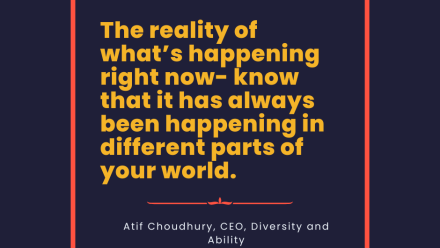Benefits of disclosing neurodiversity in the workplace
1st October 2020 by Ellie Thompson
For many neurodiverse workers, it’s difficult to know whether sharing details of your neurodiversity will be a blessing or a curse. I understand that disclosing your neurodiversity to your employer may feel like exposing yourself to bias or even discrimination; however, there are many benefits to being open and honest in your workplace. I’m Ellie and I work at Diversity and Ability, where I’ve been open about my disability and neurodiversity since I first joined the team. I’d love to share my thoughts and experiences of navigating employment as a neurodiverse person, and why I would encourage you to disclose your neurodiversity or disability in your workplace.
To receive reasonable adjustments
Disability is a protected characteristic under the Equality Act 2010, and this includes autism, specific learning differences, mental health conditions, and anything else that falls under the umbrella of ‘neurodivergence’.
This means that you are legally protected from discrimination due to your neurodiversity, and your employer is also responsible for providing reasonable adjustments to make sure your workplace is inclusive and accessible.
If you are open with your employers about the aspects of your job or workplace that you find inaccessible, for example, the communication methods used or physical environment of the office, they are obliged to make the necessary adaptations to make the workplace work for you.
Because your neurodiversity is an asset, not a deficit
Historically, disclosing neurodiversity in the workplace has been wrought with risk, with many of us facing bias, ableism and other forms of discrimination.
However, it is becoming increasingly evident that a diverse workplace is a more successful workplace; there is not only an ethical, legal and moral argument for making an organisation accessible to neurodiverse and disabled people, but a business case for doing so. It has been proved that businesses who lead in disability employment and inclusion outperform their non-accessible peers, with higher incomes and profits. For more on this, see our guest blog post from Jo Faragher.
So, rather than seeing our disability or neurodiversity as something employers have to work around or ‘deal with’, we should recognise that, actually, we are bringing vital diversity of thought and experience that will enhance, not burden, our workplaces.

To start the process of applying for an Access to Work grant
The government’s Access to Work scheme provides a grant to ensure that disabled people are able to find, and stay in, work with access to all the reasonable adjustments we need.
Through an Access to Work grant you could receive practical support such as ergonomic equipment, assistive technology, funding for transport costs, coaching, mentoring or training- and many disabled and neurodiverse workers find the experience completely transformative.
On a personal note, I have been receiving Access to Work support for the past year. Adaptations such as an ergonomic chair and noise-cancelling headphones, as well as Assistive Technology Read & Write, have made me feel more comfortable and able at work than I ever thought possible, and the workplace strategy coaching sessions have made me a more confident, efficient and successful worker.
Another Access to Work success story comes from Thomas, who receives Workplace Strategy Coaching through D&A for his work in a primary school. He says. “I deploy the strategies I have been taught daily. They have radically changed my working practice and there is a palpable difference to my approach to work.”
Although disclosing neurodiversity and disability may feel like a challenge, the benefits have far outnumbered the disadvantages of sharing with our employers.
Are you interested in learning more about how sharing your disability with your employer could benefit you?
- If you’d like to find out more about the Access to Work grant and be supported through the application process, check out our Access to Work – Find Your Way guide.


